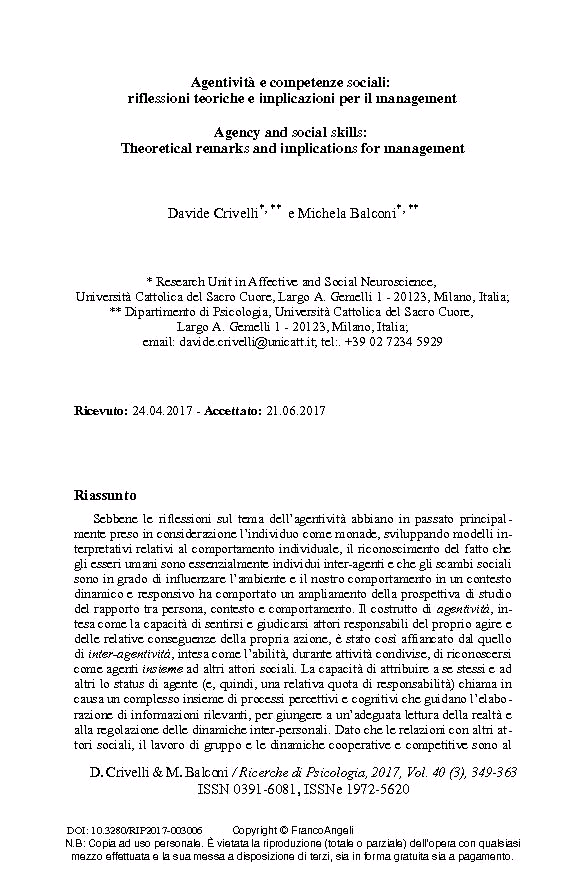Agentività e competenze sociali : riflessioni teoriche e implicazioni per il management
349-363 p.
Sebbene le riflessioni sul tema dell'agentività abbiano in passato principalmente preso in considerazione l'individuo come monade, sviluppando modelli interpretativi relativi al comportamento individuale, il riconoscimento del fatto che gli esseri umani sono essenzialmente individui inter-agenti e che gli scambi sociali sono in grado di influenzare l'ambiente e il nostro comportamento in un contesto dinamico e responsivo ha comportato un ampliamento della prospettiva di studio del rapporto tra persona, contesto e comportamento. Il costrutto di agentività, intesa come la capacità di sentirsi e giudicarsi attori responsabili del proprio agire e delle relative conseguenze della propria azione, è stato così affiancato dal quello di inter-agentività, intesa come l'abilità, durante attività condivise, di riconoscersi come agenti insieme ad altri attori sociali.
La capacità di attribuire a se stessi e ad altri lo status di agente (e, quindi, una relativa quota di responsabilità) chiama in causa un complesso insieme di processi percettivi e cognitivi che guidano l'elaborazione di informazioni rilevanti, per giungere a un'adeguata lettura della realtà e alla regolazione delle dinamiche inter-personali. Dato che le relazioni con altri attori sociali, il lavoro di gruppo e le dinamiche cooperative e competitive sono al cuore delle attività di business e di management, risulta evidente la necessità di affinare la consapevolezza del nostro e dell'altrui comportamento, del modo in cui noi e i nostri interlocutori pianifichiamo e regoliamo il comportamento e di come siamo in grado di percepirci come agenti intenzionali all'interno di sistemi sociali complessi. [Testo dell'editore].
Though traditional theories on agency primarily considered the individual as a monad and brought to the definition of interpretative models of individual behaviour, an increased focus on the intrinsic social nature of human beings and on the influence that social exchanges exert on shared environments and on our behaviour in a dynamic and responsive context broadened the investigation of the relations between person, context, and behaviour. The construct of agency, understood as the capability to sense and judge ourselves as causal agents responsible for our behaviours and relative consequences, has then been flanked by the construct of inter-agency, understood as the ability to recognise ourselves as agents together with other social agents during shared activities.
The ability to attribute to ourselves and other subjects an agentive stance (and, consequently, even a relative amount of responsibility) grounds on a complex ensemble of cognitive and perceptual processes that guides, for example, processing of information to create a proper interpretation of the social context and to regulate interpersonal dynamics. Since relationships with other social agents, team-work, and cooperation-competition dynamics are at the core of business and management activities, the need for empowering the awareness of the way we read our own and others' behaviour, of the way we and our inter-agents plan and regulate behaviour, and of the way we perceive ourselves as intentional agents within complex social systems is deemed as critical. [Publishers' text].
Ist Teil von
Ricerche di psicologia : 3, 2017-
Artikel aus derselben Ausgabe (einzeln erhältlich)
-
Informationen
ISSN: 1972-5620
THEMENBEREICHE
KEYWORDS
- Agentività, inter-agentività, competenze sociali, interazione sociale, neuromanagement
- Agency, inter-agency, social skills, social interaction, neuromanagement



